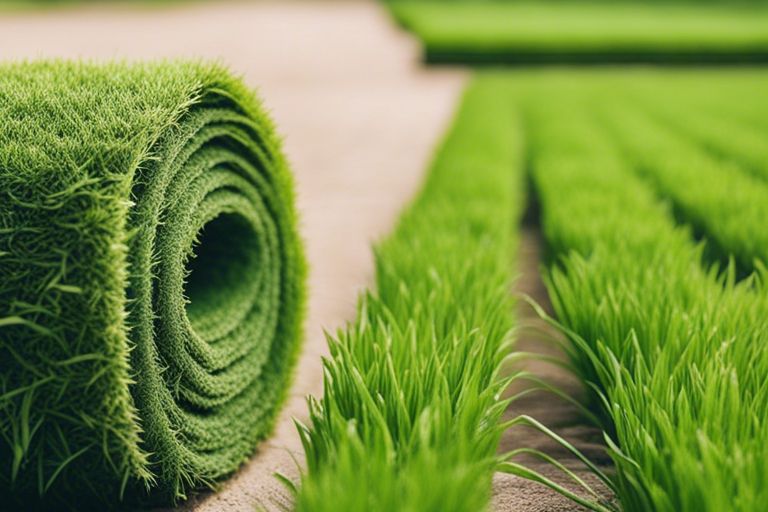Hey there! Are you tired of worrying about your water bill skyrocketing every summer? Well, I have some great news for you. I recently discovered a game-changing technology that has revolutionized the way we water our lawns and gardens – it's called smart irrigation. With this innovative system, you can save both water and money effortlessly. Trust me, it's a complete game-changer and has made gardening a breeze for me. So, in this blog post, I'm going to dive deeper into the world of smart irrigation and show you how it can benefit you in more ways than one. Get ready for a greener and more cost-effective approach to watering your plants!”
Latest technology saves money
Title: Smart Irrigation: Harnessing Latest Technology to Save Money and Conserve Water
Hey there, folks! Today, I want to talk to you about the incredible benefits of smart irrigation systems and how they're revolutionizing the way we water our gardens and landscapes. Believe me when I say, this latest technology is an absolute game-changer!
Picture this: a world where your sprinklers automatically adjust their watering schedule based on real-time weather data, soil moisture levels, and even plant type. Sounds futuristic, right? Well, thanks to smart irrigation, it's now an affordable reality.
One of the biggest advantages of smart irrigation is the significant money it saves in the long run. These intelligent systems carefully optimize water usage, ensuring that not a drop is wasted. By monitoring environmental factors and adjusting watering schedules accordingly, we are able to avoid overwatering and only provide our plants with what they truly need. This efficiency translates into water bill savings, allowing you to keep your hard-earned cash where it belongs – in your pocket.
But the benefits don't end there. Smart irrigation also helps conserve water, a precious resource that our planet desperately needs us to safeguard. By using weather data and advanced moisture sensors, these systems can detect rainfall, humidity levels, and even evaporation rates. Armed with this information, they make smart decisions to water at the ideal times and amounts, reducing water waste and promoting sustainability.
Irrigation systems with smart technology are the future. Not only do they save us money, but they also help us preserve the environment for future generations. Imagine a world where every garden, park, and farm utilizes these advancements. It's a future worth striving for, and it's within our reach now. So, let's embrace this technology and do our part to be responsible stewards of water, all while enjoying lush, healthy landscapes. Trust me, your garden and your wallet will thank you!
Water conservation & management increases sustainability
A sustainable future requires conscious practices such as water conservation and management. With increasing pressure on our planet's freshwater resources, it is vital that conscious practices are adopted in order to ensure long-term sustainability.
Water conservation refers to the careful utilization and preservation of water resources, aiming to minimize waste and maximize efficiency. By encouraging simple actions like fixing leaky faucets and using water-saving appliances, we can help preserve this precious resource. Every drop saved counts, and collectively, we can make a significant impact on water conservation.
Effective water management goes hand in hand with conservation. It involves the careful planning, allocation, and distribution of water resources across various sectors. By adopting modern technologies such as drip irrigation and wastewater recycling, we can optimize water usage and reduce strain on freshwater sources.
The benefits of water conservation and management are manifold. Firstly, they ensure a reliable and continuous water supply for future generations, preventing water scarcity. Secondly, conserving water helps reduce energy consumption, as it requires less energy to treat and transport smaller volumes of water. Thirdly, when we conserve water, we also protect freshwater ecosystems and the myriad of plant and animal species that rely on them.
Moreover, water conservation and management contribute to cost savings for individuals, businesses, and communities. By reducing water usage, we can lower our water bills and alleviate the financial burden on water systems. Additionally, sustainable water practices promote environmental stewardship, creating a cleaner and healthier planet for all.
Therefore, water conservation and management should not be considered an option but rather an urgent necessity. By prioritizing these practices, we can achieve a sustainable future while safeguarding our most precious resource – water.
Smart home irrigation increases convenience
Smart home irrigation systems offer a plethora of benefits that enhance convenience and bring a touch of modernity to any dwelling. These innovative systems employ cutting-edge technology to automate your lawn and garden watering, making your life easier and ensuring healthy plants.
One key advantage of smart home irrigation is the convenience it provides. Gone are the days of lugging heavy hoses and manually adjusting sprinklers. With a few taps on your smartphone or through voice commands with a smart speaker, you can effortlessly control your irrigation system from anywhere, at any time. Whether you're lying in bed or on vacation miles away, you have the power to activate, pause, or adjust the watering schedule with utmost ease.
Moreover, smart home irrigation offers significant time savings. Instead of spending precious hours manually watering your garden, you can dedicate that time to more enjoyable activities. Plus, smart systems are designed to optimize water usage, ensuring efficient irrigation. This not only helps to conserve water resources and protect the environment but also reduces water bills, providing significant long-term financial savings.
Smart home irrigation systems also come equipped with advanced features to enhance plant health. Many models have sensors that measure soil moisture levels, rainfall, and temperature. With this data, the system intelligently adjusts watering schedules, preventing over or underwatering. This ensures your plants receive the right amount of water, promoting lush growth and reducing the risk of pests and diseases.
You can take advantage of smart home irrigation for convenience, time savings, and improved plant health in your outdoor spaces. Embrace this modern technology and experience the benefits firsthand, as your gardening becomes effortless and your garden thrives like never before.
Water-efficient technology helps conserve resources
Are you tired of watching your hard-earned money go down the drain along with excess water usage? Well, fret no more because smart irrigation and water-efficient technology are here to save the day! These innovative solutions offer numerous benefits that not only help conserve resources but also provide convenience and peace of mind.
One of the key advantages of smart irrigation is its ability to optimize water usage. By leveraging advanced sensors and weather data, smart irrigation systems adjust watering schedules based on real-time conditions. This means that your plants and lawn receive just the right amount of water they need, avoiding overwatering and reducing water waste.
Furthermore, smart irrigation systems can be easily controlled through mobile apps. This means you can manage and monitor your irrigation system remotely, from the comfort of your own couch. No more rushing outside to manually adjust sprinklers or worrying about forgetting to turn them off. With just a few taps on your smartphone, you can ensure efficient water usage and save precious gallons.
Water-efficient technology, on the other hand, goes beyond just optimizing irrigation. It encompasses a range of innovative solutions designed to minimize water consumption in various aspects of our daily lives. From low-flow showerheads and faucets to water-saving toilets and appliances, these technologies enable us to reduce our water footprint without sacrificing comfort or functionality.
In addition to conserving resources and saving money on utility bills, embracing smart irrigation and water-efficient technology benefits the environment by reducing water pollution and protecting ecosystems. By using water more efficiently, we help maintain a healthy balance in water bodies and preserve precious natural resources for future generations.
So, if you're looking for a sustainable and cost-effective way to conserve resources, consider investing in smart irrigation and water-efficient technology. It's a win-win situation – you save money, reduce water waste, and contribute to a greener planet!
FAQ
FAQ Section: Smart Irrigation – Saving Water and Money with the Latest Technology
Q1: What is smart irrigation, and how does it save water and money?
A: Smart irrigation refers to the use of advanced technologies and data-driven systems to improve the efficiency of irrigation practices. By utilizing real-time weather data, soil moisture sensors, and automation, smart irrigation systems provide the right amount of water at the right time, resulting in significant water savings. According to a study published in the Journal of Irrigation and Drainage Engineering, smart irrigation can reduce water usage by up to 60% compared to traditional irrigation methods, leading to substantial cost savings.
Q2: Is smart irrigation only suitable for large-scale agricultural operations?
A: No, smart irrigation systems are suitable for various settings, including residential, commercial, and agricultural landscapes. While large-scale agricultural operations can derive substantial benefits from smart irrigation, such as improved crop yields and reduced water usage, homeowners and businesses can also take advantage of these technologies. A research paper published in the Journal of the American Water Resources Association highlights the effectiveness of smart irrigation systems in reducing water consumption in urban landscapes, resulting in significant water and cost savings.
Q3: Are smart irrigation systems difficult to install and operate?
A: Contrary to common misconceptions, smart irrigation systems are designed to be user-friendly and easy to install. Most systems are compatible with existing irrigation infrastructure, allowing for seamless integration. Manufacturers often provide detailed installation and operation instructions, and many offer customer support services for any inquiries or troubleshooting. Additionally, a study published in the Journal of Environmental Management concluded that smart irrigation systems were well-received by users due to their ease of installation and user-friendly interfaces.
Q4: How accurate are smart irrigation systems in determining the optimal watering needs?
A: Smart irrigation systems employ advanced technologies, such as weather-based algorithms and soil moisture sensors, to accurately determine the watering requirements of specific landscapes. Weather data, obtained through reputable sources like the National Oceanic and Atmospheric Administration (NOAA) or local meteorological services, are processed to provide real-time recommendations. By incorporating these precise measurements, smart irrigation systems can efficiently allocate water resources and prevent overwatering. A research article in the Journal of Applied Irrigation Science emphasizes the accuracy and reliability of smart irrigation systems in optimizing water application.
Q5: Do smart irrigation systems require continuous monitoring and adjustment?
A: While smart irrigation systems do require initial setup and occasional monitoring, they are designed to largely operate autonomously once configured. The systems utilize data from weather stations and sensors to automatically adjust watering schedules and durations to match the current conditions. However, occasional adjustments may be needed due to changes in landscape features or specific plant requirements. For optimal results, it is recommended to perform periodic checks to ensure efficient system performance. A study published in the Journal of Irrigation Science demonstrates the effectiveness of smart irrigation systems in minimizing manual intervention, reducing the need for continuous monitoring.
Remember, always consult with professionals or local irrigation experts for personalized advice and guidance concerning your specific irrigation requirements and installations.

